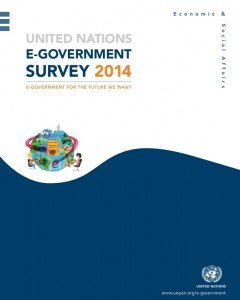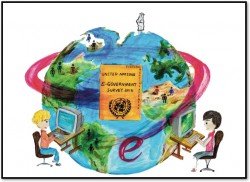|
The U.S. and United Kingdom are losing ground to Australia, Singapore, Japan and others as electronic government innovators, according to a new United Nations report. The Republic of Korea, meanwhile, retained the top spot for the third time in a row as the world’s most advanced nation in delivering government services electronically.
The 2014 United Nations E-Government Survey, released this week, is the eighth in a series of bi-annual surveys of 193 UN member states assessing advances in the electronic delivery of government information and services. The 284-page report is among the most comprehensive assessments available on e-government trends.
The study found for the first time that all 193 UN member states now have national websites or some form of online presence. It also found the number of countries that offer mobile apps and mobile portals had doubled to almost 50 countries, between 2012 and 2014. With more than 1.5 billion smart phones in use globally, and their use growing rapidly, UN officials see the mobile delivery of government services as an important tool in many countries for addressing poverty and promoting economic development, environmental protection and disaster management.
Australia, Japan and New Zealand climbed into the Top 10 ranking of most advanced e-governments in 2014, while the U.S. and U.K. slipped from their 2012 ranks, according to latest e-government survey by the United Nations.
The use of social media by governments is also increasing quickly, according to UN figures. The number of national governments using social media tripled from 2010 to 2012 and rose another 50 percent in 2014. Today 118 countries use it for e-consultation and 70 for e-government generally.
“Social media and mobile channels typically do not require high investment costs as they ride on consumerization and non-governmental platforms, but they often need a business transformation and strong commitment in the public administration to maximize benefits,” the study noted.
“The e-government story may not be new but it is entering a new episode,” the report said. “Lowering costs is still an important consideration in service delivery, but adding public value is gradually taking over as the primary goal of e-government. The view of an ‘e-government maturity model’ no longer holds.”
Instead, governments are placing emphasis on “deploying a portfolio of e-services that spans functions, business units and geographies… increasing the value of service offerings to citizens by effectively adopting disruptive technologies in an adaptive and scalable manner,” the report said.
But governments have an opportunity to take a larger role, said Richard Kerby, a senior advisor on e-government and knowledge management for the UN’s Department of Economic and Social Affairs, which produced the study with UN’s Division for Public Administration and Development Management.
“Governments need to become catalysts for change instead of mere service providers,” he said. They can become “facilitators in promoting networked co-responsibility among all stakeholders by engaging and empowering communities to take part in the solution of their own problems.”
One method for doing so, which is gaining traction according to the survey, is for governments to provide greater access to open government data and collaborate with the private sector to improve upon existing public services. While many countries use government websites to share data, the UN found 46 countries now have dedicated data portals.
Shuffle in the rankings
The ability for some countries to move faster than others in adopting disruptive technologies explains in part the rise and fall of countries in the latest UN rankings.
“Even in the case of countries with highly advanced [information and communications technology] infrastructures and human resources, it can be difficult to move to the higher stages [of e-government] with transactional and connected services,” the report’s authors said. Governments continue to wrestle over requirements for “robust data protection and online payment systems, as well as secure data sharing across government institutions.”

Image: United Nations
Those and other factors make it harder for perennial e-government leaders, including the U.S., the U.K. and the Netherlands, to continue advancing faster than some other nations. As a consequence, the U.S., which ranked second in 2010, fell to fifth in 2012 and slipped to seventh in the latest survey. The U.K. similarly dropped from third in 2012 to eighth this year; the Netherlands fell from second to fifth over the same period.
Australia, meanwhile, jumped from 12th place in 2012 to second this year, with Singapore and Japan each making similar gains. Australia’s e-government portal now offers an extensive A-to-Z list of e-services and forms, both at the federal and local levels, as well as connections to national, local and regional government websites. It also supports those looking to start a business or a new career in Australia, UN researchers noted.
Spain, Italy, Ireland, Bahrain and Uruguay were among a second tier of countries making significant gains in the UN’s e-government rankings since the last survey. Spain jumped from 23rd to 12th, while Uruguay rocketed from 50th to 26th in the global ranking, as long-term e-government planning and online services took hold. Ireland, Bahrain and Italy, all climbed into the top 25 in this year’s rankings, with Italy benefitting from a 2009 law to make the website of every public administration the main vehicle of transparency.
While Europe as a region continues to be among the most committed to delivering e-government services, it’s getting harder politically to keep advancing, compared to countries in Asia and the Gulf Region where national leaders have made digital government a central priority.
“Digital innovation, by definition, entails risk and a tolerance of failure – factors Europe still remains stubbornly resistant to embrace,” said Julia Glidden, a senior research fellow at the Vrije Universiteit Brussel – Institute for European Studies, who follows international e-government trends.
“Europe talks the talk on innovation, but unless the culture’s risk aversion changes, we are likely to see ‘New World’ countries like Australia and New Zealand continue to outpace Europe in e-gov rankings in the years ahead,” she told FedScoop, in response to the UN’s findings.
The rankings are based on extensive research conducted by UNDESA and UNPADM, which commissioned experts around the globe to complete a variety of online exercises to test how easily and thoroughly governments in all 193 member nations delivered information and services online, according to Kerby. “We had a list of more than 100 things we looked for,” he said.
Researchers also assessed availability of wired and wireless telecommunications infrastructure and the public’s literacy in each country, ultimately deriving an E-Government Development Index based on relative, rather than absolute, scores.
Advances in e-government
The shuffle of countries in the survey’s rankings belies the broader headway governments are making in using digital technologies to deliver more valuable services to citizens.

Image: United Nations
The Republic of Korea, for instance, has laid the groundwork for integrating and automating many government services by 2020. A key component of that plan is the government’s Digital Budget and Accounting System, which will ultimately integrate all the existing financial systems. The system is expected to provide real-time information sharing and transparency on the government’s revenues, spending, national assets and public debts.
France, which outscored every other nation for online delivery of government services and ranked fourth overall in the global rankings, is reviewing free alternatives to commercial ICT infrastructure and applications to the public.
The French government has also developed an official website for the French civil service, www.service-public.fr, which simplifies the way citizens, businesses and professionals access government information. It includes a section on citizen’s rights and provides practical services to help with administrative procedures, forms and contracts. It also features a directory including 11,000 national services, 70,000 local civil services and access to the main portals of European nations and institutions and international organizations.
And while the U.S. may have lost some luster in the e-government rankings, it continues to set the pace in making a growing collection of applications and application interfaces available to the public. These APIs, many of which are designed for mobile applications, are helping to spur new business services in the private sector.
The UN study covers a variety other dimensions on electronic government, such as the degree of electronic participation by citizens. It found, for instance, that the populations of the Netherlands, Republic of Korea, Uruguay, France, Japan and the UK are the most actively engaged electronically with their governments. It also noted that citizens not only expect access to public information anywhere, anytime via multiple channels, but also they are increasingly becoming co-creators of public value.
The report also raised fresh concerns about the challenges of serving the disabled and digitally-disadvantaged and vulnerable groups, such as immigrants, within populations. Kerby noted that these challenges are prevalent in both developed and developing countries.
The full report, along with interactive access to the 2014 data, as well as all of the UN’s e-government surveys, dating back to 2003, are available on at http://unpan3.un.org/egovkb/en-us/Data-Center.
|